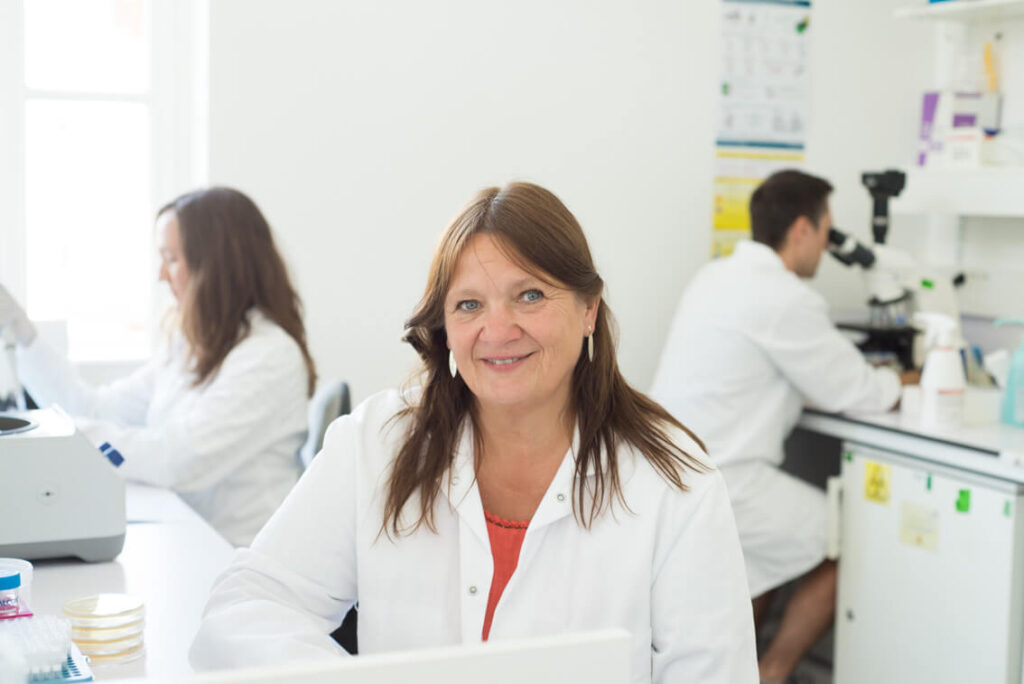#FEMSmicroBlog: From the lab bench to editor’s chair: How Prof. Carmen Buchrieser built a career in science
For Prof. Carmen Buchrieser, what started off as an interesting subject in high school evolved into a lifelong pursuit of understanding the microbial world. Today she is a powerhouse within the scientific microbiology community. A professor at the Institut Pasteur and Editor-in-Chief of microLife, the open-access journal supported by the Federation of European Microbiological Societies (FEMS), she has shaped the field through her groundbreaking research on Legionella and commitment to advancing scientific discovery. In recognition of her lifelong contributions, Prof. Buchrieser is the 2025 recipient of the prestigious FEMS-Lwoff Award. She has come a long way since her first introduction to biology, paving the way to uncovering scientific truths. Here’s her story.
There were many things that inspired Prof. Buchrieser to get into science, but the spark was lit by her high school biology teacher. The teacher’s enthusiasm for the subject and engaging instruction fostered an early fascination and love for biology, ultimately setting her on a fulfilling career path.
Early experiences that shaped the trajectory
While studying biology in Austria, she completed two formative internships that continue to inform her work decades later. The first, in a medical microbiology lab at the university, that exposed her to the world of real-time infectious disease diagnostics. There, she learned how to identify bacteria using different biochemical tests and microscopy analysis, and to determine antibiotic resistance profiles. Often working with samples from intensive care patients, the urgency and complexity of that experience fuelled her interest in bacteria and their adaptability.
This first working experience awoke my interest in bacteria and their incredible capacity to adapt and cause disease.
The second internship took her to Cape Verde Islands, where she participated in a government-sponsored development aid project. There, she spent four months with a group of development agents, helping identify local bacterial pathogens and their antibiotic resistance patterns in a region facing significant healthcare challenges.
This experience proved pivotal. The merging of science, public health, and global impact solidified her interest in microbiology, in particular of pathogenic bacteria.
This was somehow, I think, the moment where I decided to go in this direction for my postdoctoral trainings, and finally for my entire career.
Captivated by a variety of approaches
While Prof. Buchrieser’s research centres on infectious diseases, she finds it difficult to single out one research area as the most rewarding. Her career has been driven by curiosity and a passion for exploring diverse scientific questions. This curiosity is driving the development of an integrated approach in her lab; one that combines disciplines such as comparative and functional genomics, evolution, molecular and cell biology, high-throughput imaging, and metabolism. By bringing these areas together, her team seeks to understand how bacteria evolve, cause disease, and how strategies to combat infectious diseases can be improved. She emphasized that scientific fulfilment doesn’t come from a single area, but from the interplay of many.
By pulling these areas together, they investigate how bacteria evolve, causes disease, and ultimately how we can improve strategies to combat infectious diseases more effectively. But I don’t think there’s only one rewarding research area that exists.

Balancing motherhood and research
One of the trickier parts of Carmen’s career, she shares, was balancing research with raising children. She became a mother shortly before defending her PhD, and again two years later while still an early-career researcher. During this time, she pursued postdoctoral positions; first in France, then in the United States, before returning to France for a third postdoc at the Institut Pasteur, where she continues her work today. These international moves, involving shifts in language, culture, and institutions, had to be managed while raising two young children. Carmen credits the constant support and shared responsibilities of her husband, also a scientist. Sharing the demands of raising kids and navigating the challenges of academic life together, made both, her personal and professional journeys deeply fulfilling.
Leading her own lab
Among the highlights of her career, she emphasized the privilege of leading a research group at the Institut Pasteur and having the freedom to independently direct her own scientific investigations. She also highlighted the opportunity to build and develop her own research team, describing it as both a privilege and a continuous source of fulfillment. The research achievements over the years, she noted, would not have been possible without the many talented, dedicated, and motivated students, postdocs, and scientists from around the world who joined her lab. Working with such a diverse and passionate group, she said, remains a constant highlight of her career.
To build and develop my own research team has been particularly rewarding. The research carried out during all these years would not have been possible without the many talented, excellent, and motivated students, postdocs and research scientists from all over the world that have joined my lab. So, it’s a constant highlight because it’s really fun to work with all these people.
Championing society publishing
What Prof. Buchrieser appreciates most about microLife, the journal for which she is one of the Editors-in-Chief is its foundation; created in collaboration with the scientists of the European Academy of Microbiology, a group she regards as representing the highest quality in the field. For her, this involvement guarantees scientific excellence in the journal’s output.
She also values microLife’s status as a society journal, supported by FEMS (Federation of European Microbiological Societies). For Carmen, working with and publishing in society journals is especially meaningful because it ensures that the article processing charges paid for open access publication are not profit-driven, but instead reinvested into the scientific community. These funds help support student and postdoctoral fellowships, enable attendance at conferences, and contribute to organizing events and educational training opportunities in microbiology.
She finds this model deeply rewarding and sees microLife as a growing journal with a strong future; one she hopes will continue to thrive for many years to come.
Prof. Buchrieser will be delivering the keynote lecture during FEMS MICRO Milan 2025. Join us for her keynote and many more interesting conversations on microbiology during the Congress: Register for your ticket now
As this year’s FEMS-Lwoff Awardee, her talk will reflect a career dedicated to excellence, innovation, and impact in microbiology.
Listen to Prof. Buchrieser’s full interview on our Microbes And Us podcast: A conversation with Prof. Carmen Buchrieser, our Lwoff Awardee for 2025

